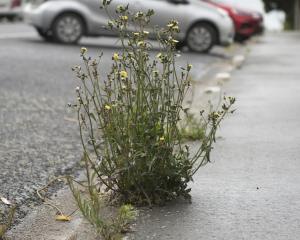Vegetables
If the weather seems to promise an early spring, it is tempting to rush into seed-sowing, but a cautious approach will pay off later, with fewer plant losses.
In warm corners, in the greenhouse or under glass, a few seeds of cabbages, cauliflower and Brussels sprouts can be sown. Bolder gardeners may also want to try their luck with lettuce, spinach and mini-carrots but the weather will determine success.
Brussels sprouts should have priority in terms of seed-sowing, as they require the longest growing season of the brassicas, which include cabbage and cauliflower.
Sprouts will take two to three months from sowing to transplanting into the garden where they are to mature. Plants will grow to 1m or more and may need soil mounded firmly around their bases to hold them in the ground. In very windy gardens, staking can be necessary. To help keep white butterflies and aphids away, pyrethrum (Chrysanthemum cinerarifolium) plants can be grown around brassicas but the pyrethrum must be allowed to flower, as most of the insect-repelling properties are in the daisy-like blooms.
The earliest potatoes - Jersey Benne remains a favourite with Southern gardeners - may be planted now but will need protection from frost when shoots come through.
Covering plants with frost cloth, or pea straw piled loosely over the rows and held in place with netting, are alternatives to using newspaper when frost looks likely.
Rhubarb, Jerusalem artichokes and asparagus can be planted now. The site for Jerusalem artichokes should be chosen with care; these tough relatives of the sunflower can be invasive.
Wood ash was a widely used fertiliser in the 19th and 20th centuries but can contain toxins that can leach into the soil. Use a commercial potash preparation instead. Coal ash should not be used on the garden.
With little sign of growth in the lawn, have your mower serviced and blades sharpened now. Check garden tools and sharpen secateurs, loppers and spades. Always clean garden tools after use and wipe blades of secateurs and loppers.
Flowers
Although sowing may be weeks or even months away, do not delay buying seed, as popular varieties are the first to go. Store seed in airtight containers in a cool place.
Delphiniums are among the easiest perennials to grow from seed. Pacific Giants and Shogun will grow to 1m or more, while Delphinium grandiflorum will reach just 30cm.
Delphiniums come in shades of blue, pinks and mauves, as well as white. The centre of the flower (the bee) is black or white. Some seed companies offer individual colours or indicate bee colour. Generally, delphiniums come into their own a year after planting out. Seed needs warm conditions (18degC to 20degC) to germinate, so do not rush to sow it.
If the weather is fine and the soil not waterlogged, Michaelmas daisies, delphiniums, penstemons and phlox can be broken up then replanted in well-composted soil to give better flowers over the next two or three seasons. If slugs and snails attack young shoots, protect by surrounding the plants with dry sawdust.
To divide these hardy perennials, lift the clumps with a fork, then use a sharp spade to slice through the plant. Cleaning flower pots is a tedious task but worth the effort to prevent the possibility of disease. Scrub pots then dunk them in boiling water.
Fruit
Keeping the ground clear around apple, pear and stone-fruit trees will help keep the trees free of disease. Do not leave fruit on trees over winter and always gather windfalls and prunings.
Heritage fruit trees, particularly apples, are gaining popularity. Many ceased to be commercially produced because of uneven fruit shape or size, inability to store well over long periods or a biennial fruiting cycle (lots of fruit one year followed by a smaller crop).
None of these factors should deter the home gardener from growing apples such as Hetlina, Reinette du Canada and Allen's Everlasting.
Old varieties often have the advantage of being more disease-resistant than modern cultivars, making them suitable for organic gardening or for those who do not have time to spray.







